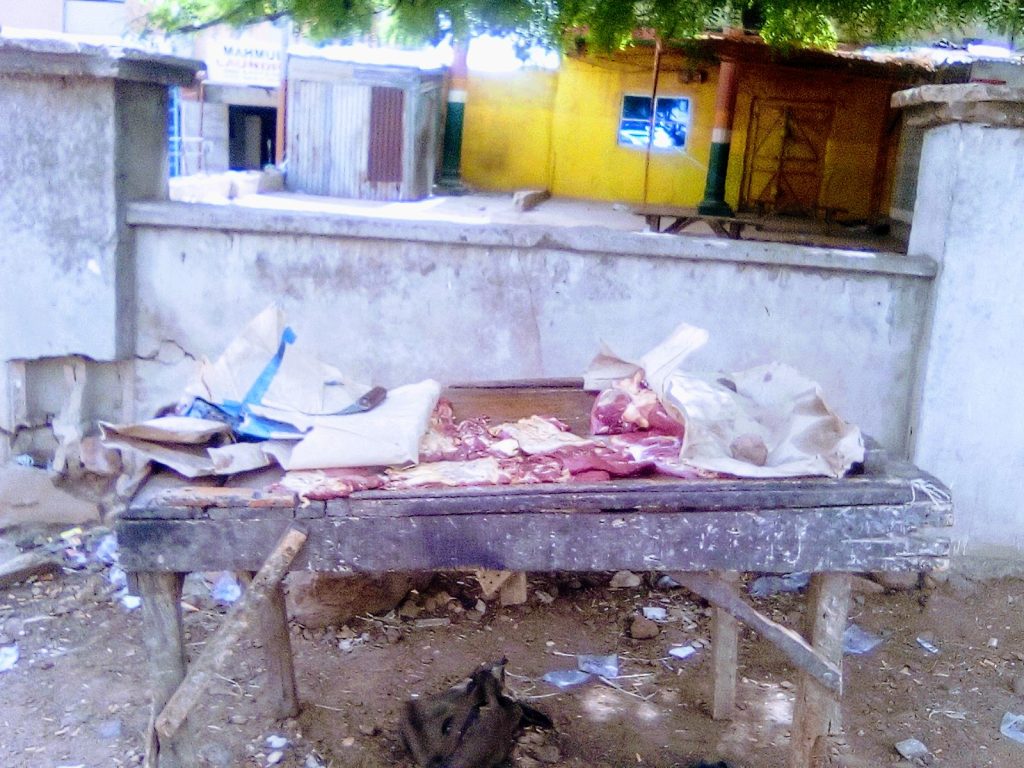The abattoirs of Sokoto State are witnessing a crisis that is deeply affecting both local meat sellers and their customers. The rising cost of livestock is forcing butchers to find creative ways to manage their businesses while customers grapple with skyrocketing prices, making it harder to afford daily staples.
The butchers’ struggle: coping with higher costs
For the butchers of Sokoto, each day brings new challenges. Meat prices at the abattoirs have surged, impacting their ability to sell at affordable rates. Sellers like Mr Shehu Mori, who operates by the roadside opposite Dogon Daji House, are at the forefront of this struggle.
“I source my meat from the Sokoto abattoir and begin selling at 10 am daily,” Mori explained. “Households and passersby rely on us for their meat. But the current prices are driving customers away. It’s disheartening.”
Mori’s plight is shared by many in Sokoto. The increased cost of cows, goats, and rams means higher selling prices, which customers often cannot afford. Some butchers, like Mori, have adapted by diversifying their sales – turning unsold meat into suya, a popular grilled meat, to avoid spoilage and attract evening buyers.
Preserving profits: The suya strategy
In a small stall on Offa Road, Mr Mubarak Maigoma has found a way to navigate the fluctuating meat market. “I buy meat from the central market abattoir in the morning to sell raw,” he said. “In the evening, I switch to selling suya to prevent the meat from spoiling. If there is electricity, I use a refrigerator to keep it fresh.”
Maigoma’s adaptive approach reflects a broader trend among Sokoto’s butchers, who are increasingly turning to suya to preserve their stock and maintain profitability. The shift from raw meat to suya is not just a survival tactic but also a response to the community’s demand for affordable and readily available food options.
The economics of meat: A delicate balance
Mr. Umar Abdullahi, a butcher on Goronyo Road, provides a detailed glimpse into the financial challenges faced by meat sellers. “I buy my rams from the modern market and take them to the abattoir for slaughtering. Selling small pieces of meat is more costly. A full ram costs about N90,000, but smaller portions can go for N45,000 to N50,000. After selling the meat, I might make a profit of just N10,000 to N15,000.”
Abdullahi prefers selling suya over raw meat, as it offers better margins. “When I buy a whole ram, I sell it as suya because it is more profitable. Last year, I could buy a full ram for N75,000 and make a good profit. Now, with higher prices, my customers complain about the portions being too small. They used to thank me for my generous cuts, but not anymore.”
Customers’ plight: The rising cost of a staple
For Sokoto’s residents, the rising cost of meat is hitting hard. Regular customers like Mr. Abubakar Ismail are feeling the pinch. “The meat I used to buy for N500 now costs N1000,” he said. “Even N500 worth of meat isn’t enough for a decent meal anymore. Despite the cost, I continue to buy from Mr Mubarak because he treats me well and is always friendly”, he told ASHENEWS.

Similarly, Mr. Shansu Bello, who buys suya daily for his family because they love it, has seen his expenses soar. “Every day, I park my car after work and buy suya of N3000 for my kids and wives. But since prices have gone up, N3000 worth of suya isn’t enough anymore, so I started buying N7000 to N8000 worth of suya daily.
“It is really affecting my finances, but I can’t stop now because my children are used to it. When I come home in the evening and get out of the car, they come to greet me and look for the suya. When they see it, they start laughing and thanking me”, he bemoaned.
The broader implications: Health and nutrition at risk
The impact of rising meat prices goes beyond economic strain. It also affects nutritional standards and public health. Wasiu Afolabi, president of the Nutrition Society of Nigeria, highlights the long-term consequences.
“The soaring costs of protein-rich foods could persist if agricultural productivity continues to be hindered by insecurity,” he told BusinessDay. “People are shifting from nutritious diets to whatever they can afford, which compromises their immunity and increases their vulnerability to diseases.”
Afolabi’s concerns underscore a significant public health issue: the affordability of a healthy diet. “The cost of producing animal-sourced foods like eggs, beef, and fish has risen due to the high cost of feed. Most households can no longer afford these staples. Even vegetables are becoming unaffordable. This trend is pushing nutritious diets out of reach for many Nigerians.”
Seeking solutions
The crisis in Sokoto’s meat market is a microcosm of broader challenges facing Nigeria. The rising costs of essential food items, driven by a combination of economic factors and agricultural constraints, demand urgent attention. Effective measures to stabilize the market and support both producers and consumers are crucial.
For the butchers and residents of Sokoto, the daily struggle continues. As they adapt to the harsh realities of the current market, there is a collective hope for sustainable solutions that can bring relief and restore a sense of normalcy to their lives.


